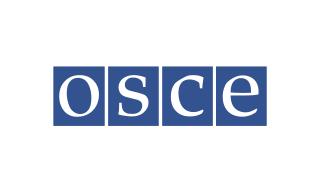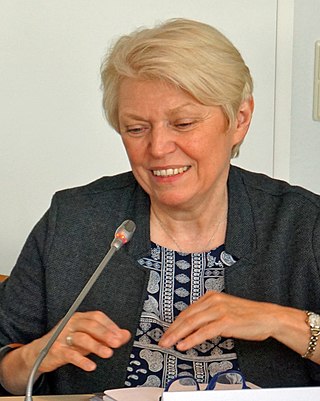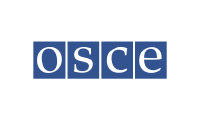
The Community acquis or acquis communautaire, sometimes called the EU acquis and often shortened to acquis, is the accumulated legislation, legal acts and court decisions that constitute the body of European Union law that came into being since 1993. The term is French: acquis meaning "that which has been acquired or obtained", and communautaire meaning "of the community".

The Council of Europe is an international organisation with the goal of upholding human rights, democracy and the rule of law in Europe. Founded in 1949, it brings together 46 member states with a population of approximately 675 million as of 2023; it operates with an annual budget of approximately 500 million euros.

The Organization for Security and Co-operation in Europe (OSCE) is a regional security-oriented intergovernmental organization comprising member states in Europe, North America, and Asia. Its mandate includes issues such as arms control, the promotion of human rights, freedom of the press, and free and fair elections. It employs around 3,460 people, mostly in its field operations but also in its secretariat in Vienna, Austria, and its institutions. It has observer status at the United Nations.

The Commission on Security and Cooperation in Europe (CSCE), also known as the U.S. Helsinki Commission, is an independent U.S. government agency created by Congress in 1975 to monitor and encourage compliance with the Helsinki Final Act and other Organization for Security and Co-operation in Europe (OSCE) commitments. It was initiated by House representative Millicent Fenwick and established in 1975 pursuant to Public Law No. 94-304 and is based at the Ford House Office Building.

La Strada International (LSI) is an international NGO network addressing the trafficking of persons in Europe.

The Southeast European Cooperative Initiative (SECI) is a multilateral regional initiative that has been initiated by the European Union, the United States of America and the countries of Southeast Europe within the framework of the Organization for Security and Cooperation in Europe (OSCE) as a support to the implementation of the Dayton Accords in December 1996 at the inaugural session at Geneva on the basis of Final Points of Common EU-USA Understanding.
The OSCE Minsk Group was created in 1992 by the Conference on Security and Cooperation in Europe (CSCE), now Organization for Security and Co-operation in Europe (OSCE), to encourage a peaceful, negotiated resolution to the conflict between Azerbaijan and Armenia over Nagorno-Karabakh.

Doris Barnett is a German politician and member of the SPD.
Turkey is a founding member of the United Nations, the Organisation of the Islamic Conference, the Organisation for Economic Co-operation and Development and the Organization for Security and Co-operation in Europe, has been in the Council of Europe since 1949, and in NATO since 1952. Since 2005, Turkey is in accession negotiations with the European Union, having been an associate member since 1963 and is also in European Customs Union. Turkey is also a member of the G20 industrial nations which brings together the 20 largest economies of the world.

The European Union (EU) uses a number of symbols, including the Flag of Europe, Anthem of Europe, Motto of the European Union and Europe Day.
The Fighting Discrimination Program of Human Rights First focuses on the violence known as hate crimes or bias crimes. Because equality is a cornerstone of human rights protection, discrimination in all its forms is a violation of human rights. Discrimination can take the form of violence generated by prejudice and hatred founded upon a person's race, ethnicity, religious belief, sexual orientation, gender, disability, age or other such factors. Through the Fighting Discrimination Program, Human Rights First seeks to combat discrimination by reversing the tide of antisemitic, anti-immigrant, and anti-Muslim violence and reducing other bias crime in North America, Europe, and the Russian Federation.
The Vilnius Declaration was a declaration adopted by the Organization for Security and Co-operation in Europe (OSCE) during the 18th annual session of its parliamentary assembly, that took place in Vilnius from 29 June to 3 July 2009.

From the end of February 2014, demonstrations by Russian-backed, pro-Russian, and anti-government groups took place in major cities across the eastern and southern regions of Ukraine in the aftermath of the Euromaidan and the Revolution of Dignity, which resulted in the ousting of Russian-leaning President Viktor Yanukovych. The unrest, which was supported by Russian military and intelligence, belongs to the early stages of the Russo-Ukrainian War.

Michael Georg Link is a German politician of the Free Democratic Party (FDP) who has served a member of the Bundestag from 2005 to 2013 and again since 2017. In addition to his parliamentary mandate, he has been serving as the Coordinator of Transatlantic Cooperation at the Federal Foreign Office in the coalition government of Chancellor Olaf Scholz since 2022.
The Geneva International Discussions (GID) are international talks to address the consequences of the 2008 conflict in Georgia. They were launched in Geneva, Switzerland, in October 2008 and are co-chaired by the Organization for Security and Co-operation in Europe (OSCE), the European Union (EU), and the United Nations (UN), the Geneva process brings together representatives of the participants of the conflict—Georgia, Russia, and Georgia's breakaway Abkhazia and South Ossetia—as well as the United States.

OSCE Mission to Croatia was the field mission of the Organization for Security and Co-operation in Europe operating in Croatia in from July 1996 until the December 2007. The Mission become preeminent international organization in Croatia after the departure of UNTAES forces from the Eastern Slavonia, Baranja and Western Syrmia.

Relations between Azerbaijan and the Organization for Security and Cooperation in Europe (OSCE) began when Azerbaijan joined OSCE’s predecessor, the Conference on Security and Cooperation in Europe (CSCE), on January 30, 1992. This was the first European organization Azerbaijan joined. The CSCE transformed into the OSCE shortly afterwards in 1995.
Catherine M. Croft is a United States Department of State official who has served as a special advisor for Ukraine both in the State Department and on the United States National Security Council. Croft testified in closed-door hearings before the House Intelligence, Oversight and Foreign Affairs committees in October 2019.

An OSCE Needs Assessment Team in Armenia was deployed by the Organization for Security and Co-operation in Europe (OSCE) in the territory of the Republic of Armenia between 21 and 27 October 2022 following the Armenia–Azerbaijan border crisis.

Armenia–OSCE relations began when Armenia joined the OSCE's predecessor, the Conference on Security and Cooperation in Europe (CSCE), on 30 January 1992. The CSCE transformed into the Organization for Security and Co-operation in Europe (OSCE) shortly afterwards in 1995.















